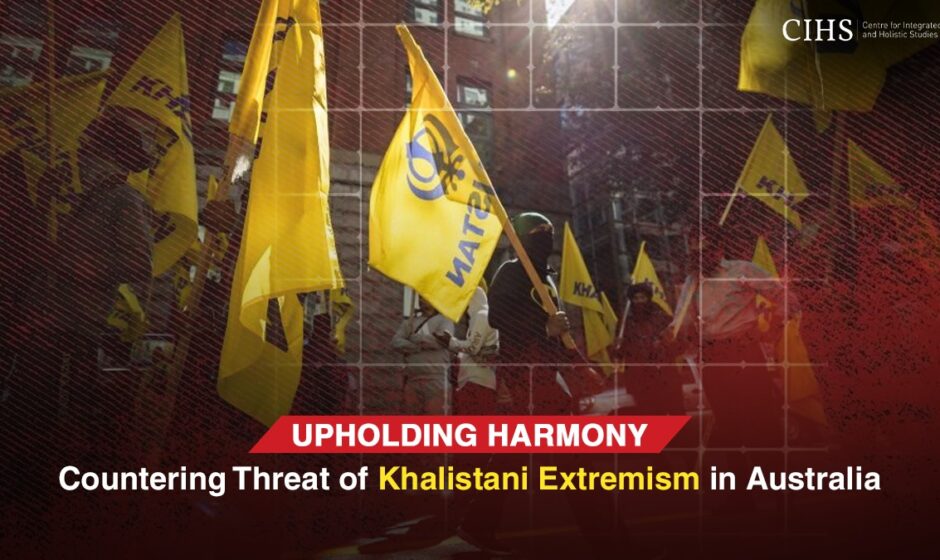Proposed anti-harassment laws by Victoria’s Premier and uneven anti-terror enforcement expose gaps in protecting Indian diaspora communities, especially Hindus from Khalistani & Islamists.
Triveni Kaul
Australia prides itself on being a vibrant multicultural society, celebrating diversity and fostering harmony among its communities. However, recent incidents involving Khalistani extremism have disrupted this balance, targeting Indian and Hindu diaspora. The emergence of such extremism poses a grave challenge to Australia’s social fabric and raises urgent questions about the safety of vulnerable communities within this framework. Addressing this issue is critical to preserving Australia’s inclusive ethos and ensuring justice for those affected.

Over the past few years, Khalistani extremists—advocates for a separate Sikh state carved out of India—have amplified their activities in Australia. While they claim to pursue political objectives, their actions have often crossed into the realm of harassment, vandalism, and violence, disproportionately affecting the Indian and Hindu diaspora. These incidents demand immediate attention to safeguard the multicultural ideals that underpin Australia’s identity.
Australian Indian/Hindu Diaspora
Indian Australians, particularly Hindus, have increasingly found themselves at the receiving end of targeted attacks fueled by Khalistani extremism. Reports of temple vandalism, such as the defacement of iconic Hindu temples in Melbourne earlier this year, have sent shockwaves through the community. Graffiti glorifying separatist leaders and slogans promoting violence have not only defiled sacred spaces but also instilled a sense of insecurity among devotees.
Harassment and intimidation tactics have extended beyond physical locations to digital spaces, where diaspora members have faced online abuse and threats for expressing their views. Community leaders have reported incidents of individuals being followed, heckled at public events, and receiving threatening messages for opposing extremist narratives. The psychological toll on victims, compounded by fears of escalating violence, has been profound.
The most alarming aspect of these challenges is the sense of alienation it fosters. Many Indian Australians feel let down by the lack of decisive action to address their grievances, raising concerns about equitable protection within Australia’s multicultural framework. This growing disillusionment risks undermining trust in the system and eroding the social cohesion that defines Australian society.

Legal Frameworks Disparity
Australia has robust laws to counter terrorism and hate crimes. However, the rise of Khalistani extremism highlights gaps in existing frameworks, particularly in addressing forms of violence that straddle the line between political activism and community harm.
Victoria has recently proposed anti-harassment laws aimed at protecting individuals and communities from targeted abuse. These laws, if enacted, could offer a crucial safeguard for diaspora groups facing systematic intimidation. However, critics argue that enforcement will be key, as legislation alone cannot deter well-organized extremist networks.
Australia’s anti-terrorism legislation—designed to counter threats from all forms of extremism—provides mechanisms to monitor and prosecute individuals engaging in terror-related activities. Yet, its application has been uneven, with limited cases of enforcement against those propagating Khalistani extremism. This disparity underscores the need for nuanced legal interpretations that recognize the diaspora’s unique vulnerabilities.
Recent dialogues between Indian and Australian authorities have signaled a shared commitment to combating extremism. Joint initiatives to curb funding channels for extremist groups, coupled with intelligence-sharing agreements, mark important strides. However, tangible outcomes remain elusive, necessitating deeper collaborations and policy alignment.
Policy Recommendations
To address the growing threat of Khalistani extremism and protect the Indian/Hindu diaspora, a multi-pronged approach is essential. Key recommendations include:
- Strengthening Legal Protections: Expediting the enactment of anti-harassment laws in Victoria and other states is imperative. These laws should explicitly address targeted attacks on ethnic and religious groups, ensuring swift recourse for victims. Simultaneously, anti-terror legislation must be rigorously applied to dismantle extremist networks.
- Community Engagement Initiatives: Fostering dialogue between law enforcement agencies and diaspora communities can build trust and facilitate information-sharing. Programs that promote cultural awareness and mutual understanding among Australia’s diverse communities can also help counter extremist narratives.
- India-Australia Collaborations: Leveraging bilateral ties to address transnational extremism is crucial. Joint task forces to track and disrupt the flow of funds and propaganda from overseas sources can significantly weaken extremist networks. Additionally, Australia’s support for India’s stance on separatism can send a strong message about its commitment to upholding democratic values.
- Support Systems for Victims: Establishing dedicated helplines, counseling services, and legal aid for individuals affected by extremism can alleviate the trauma of targeted attacks. Empowering community organizations to act as intermediaries can also ensure that victims’ voices are heard and acted upon.
- Public Awareness Campaigns: Educating the broader Australian population about the dangers of extremism and its impact on social harmony is vital. Highlighting the contributions of the Indian and Hindu diaspora to Australian society can counteract divisive narratives and foster inclusivity.
Concluding Observations
Targeting of Indian and Hindu diaspora by Khalistani extremists represents a direct threat to Australia’s multicultural values. Proactive measures are essential to protect the rights of vulnerable communities and uphold the principles of diversity and inclusion. Australia’s commitment to multicultural harmony must translate into decisive action against extremism. By strengthening legal protections, fostering community engagement, and enhancing collaborations with India, Australia can ensure that its social fabric remains resilient in the face of divisive forces. Safeguarding the Indian and Hindu diaspora is not just about protecting a minority; it is about preserving the ideals that make Australia a beacon of coexistence and mutual respect.
(Author is a corporate professional and foreign affairs enthusiast, she is a contributing writer at CIHS)



